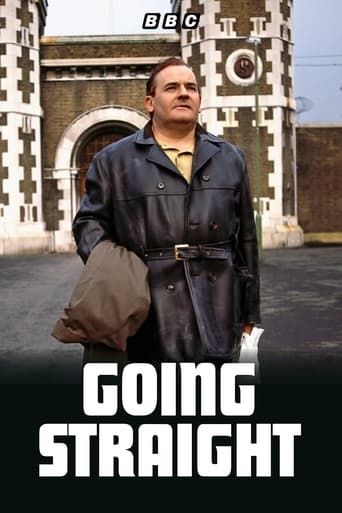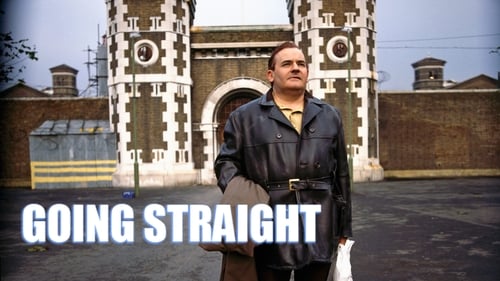ezysmoke
Brilliance, itself,as a follow on to porridge, unfortunately due to the untimely death of richard beckinsale, i believe this shortened, what would have become, a thriving, multi-series show, as porridge was...
British comedy at its best, with legend status, shame nothing these days can come anywhere near , ronnie barkers wisdom and wit...Julez.....
Dlp07
Having just seen Going Straight for the first time on DVD, I'd have to say it's terribly underrated. A sequel to Porridge that was so different (being set "On the outside" and with most of the Slade prison supporting cast gone) was always going to divide audiences. There are some brilliant episodes and moments though- including Fletch bumping into Mr. MacKay on the train home (in one of their best ever scenes together they part company getting drunk together and even shake hands). A pr Only Fools And Horses Nicholas Lyndhurst is excellent as Fletch's vague son, Raymond too. Most interestingly though, along with the Porridge film, Going Straight represents a kind of missing link between the gentler '70's writing of Clement and La Frenais with series like The Likely Lads and the earthier, more realistic style of Auf Wiedersehen Pet and The Commitments.The main attraction for most people though, should be to find out what became of Fletcher in the end (although it was made later the Porridge film is obviously set before this).Whilst it's still mainly broad, old school sitcom humour, Going Straight has several more serious moments as Fletch and his family struggle to make their way without him having to return to crime. The episode in which he helps a cynical teenage thief to change her ways is particularly poignant. The looming threat of Thatcherism hangs over this series like some huge dark shadow about to turn the British working class into the underclass and unscrupulous, upwardly mobile "Greed is good" types- as the writers would go on to explore with Auf Wiedersehen in the '80's.Clement and La Frenais have done an incredible job, not just with their almost unbeatable comedy writing (only John Sullivan comes close as far as I'm concerned), they have also left us these brilliant documents of British social history over the past forty years. Going Straight is just as much a valid part of this as Porridge, The Likely Lads and Auf Wiedersehen.
Theo Robertson
PORRIDGE was a classic sit com due to the characters and how they interacted with one another so was it a good idea to have a spin off from the show where most of the characters disappeared ? It's kind of like making a spin off from ONLY FOOLS AND HORSES where Del and Rodney don't appear , no one one would ever dream of doing that would they ? What they did ? Oh dear The most memorable thing about GOING STRAIGHT was the theme song sung by Ronnie Barker " I'm going straight I am straight as an arrow ... " and that's mainly the start and finish of memorable moments . The first episode was undoubtedly the best since it featured the last television appearance of Mr McKay the head screw of HMP Slade . There is a very intelligent context for this since the opening episodes of PORRIDGE and GOING STRAIGHT both feature Mckay and Fletcher on a train so we see a dramatic example of full circle . The plot itself featured McKay being mistakenly accused of theft and Fletcher putting the world to rights in a great example of character development where Mckay thanks Fletch " I'll never forget this Fletcher " Ironically enough McKay seems to be the only person in the world who hasn't forgotten GOING STRAIGHT but it's easy to see why it's forgotten . One episode revolves around Fletch going to collect some money he's buried before he got put away only to discover that a block of houses has been built on his stash . This plot had already appeared in countless British B movies and wasn't all that funny to begin with . Another episode involved a budgie in a cage and Fletch feeling sorry for it so he releases it and he later relates to his daughter and Godber what he has done " I knew how it felt so I let it go ... and next doors cat eat it " GOING STRAIGHT shows that if you have a winning formula like PORRIDGE it's a bad idea to change the formula via a spin off
bob-hossack
'Going Straight' is often thought of as a failed sequel to 'Porridge.' However, it would help to think of the show as an epilogue to 'Porridge.' If both shows were called 'Fletcher' then I very much doubt that any distinction would be made between the two.By the time the show was written Ian La Frenais, Dick Clement and Ronnie Barker had the mind of Fletcher down to a tee. This in itself made the series superb - with some of the finest writing and acting to adorn our T.V. screens. But there is a more important point to 'Going Straight.' Although 'Porridge' tried to relate the daily grind of prison life it was, by it's very nature, a comedy programme. Fletcher's spirit, intelligence, humour and status inside 'Slade' almost made you want to commit a felony and go and join him. However, once outside he became a 'nobody.' The writers cleverly showed that outside a prison Fletcher was on life's bottom rung - on course for a life of menial work, low status and even lower pay. Fletcher finds himself very frustrated at the lack of opportunities for ex-cons, especially at his age, and this comes through in the series quite strongly. Personally, I admired him in 'Porridge' and pitied him in 'Going Straight.' In 'Porridge' it was often referred to that the system can't be beaten. 'Going Straight' showed that even after having served time for crimes the system still controls your destiny. A lesson for us all.




